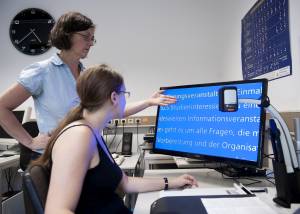Reading software makes texts audible for the blind, special apps offer learning options for people suffering from autism, video telephony enables telephone conversations in sign language. The extent to which technical developments can enable independent participation of people with disabilities is in the focus of the study “Assistive Technologies for the Inclusion of People with Disabilities into Society, Education, and Jobs” led by Karlsruhe Institute of Technology (KIT). One result: Technology for inclusion into employment exists, but often information on its potential uses is lacking.
Most people with disabilities are very much in favor of and open to proven and new technologies that enable them to lead a more independent life, the study shows. “But technology alone is not enough. It is important to develop social and political options tailored to the needs of people with disabilities,” says health scientist Maria João Ferreira Maia of KIT’s Institute for Technology Assessment and Systems Analysis (ITAS). The Institute studied the importance of assistive technologies (ATs) for the inclusion of the blind and visually impaired, the deaf and hearing impaired, and people with autism spectrum disorders on behalf of the STOA (Science and Technology Options Assessment) panel of the European Parliament.
Companies, Physicians, and Users Need Information and Advice
A key indicator of independent participation in society is inclusion into the employment world. ATs can enable people with disabilities access employment in many ways. A Braille keyboard on the computer enables the blind to input text. People with autism spectrum disorders can use a virtual environment to train interaction with colleagues. “The technology exists, but many companies still lack information about its possible uses,” says Dr. Linda Nierling, social scientist and coordinator of the research project at ITAS. Lacking knowledge may lead to a company not even considering employment of a person with a disability. Basically, the study finds that a profound change of the society’s attitude to people with disabilities is the prerequisite for a barrier-free, inclusive society. The study also sees a need for information and advice among physicians and the users themselves. It recommends that specially trained AT experts advise physicians and people with disabilities in choosing the most helpful assistive technology in each individual case. “The differences between medical or technical aids developed especially for people with disabilities and mainstream devices increasingly disappear. However, licensing and approval of a medicinal product take much longer,” Nierling says. Many expectations are associated with current and future successes in research. But even now, existing technologies might be used more efficiently, if operability of all consumer end devices was facilitated, as is envisaged by the draft European Directive for Barrier-free Products and Services, the European Accessibility Act.
The study covers good examples of government regulations for promoting integration with the help of ATs in Sweden, Hungary, Portugal, and Germany as representatives of the EU member states. Four future scenarios of the study outline how society can develop more or less barrier-free as a result of different political framework conditions. The scenarios, among others, compare an inclusive society to a society with prejudices and analyze different extents of technological development, the economic situation, and the role of the state in the provision and funding of ATs. “It is an appeal to the decision-makers in politics: In the best case, accessibility will be a matter of course everywhere in the future, in buildings, when operating ticket or cash machines, in the education system, and at the workplace,” the scientists of ITAS emphasize.
About the Study
The advisory and research project funded with EUR 140,000 by the European Parliament focused on the question how technical aids can contribute to including more people with disabilities into society, the education system, and the labor market. Interviews of persons working in disability organizations or suffering from disabilities were part of the study as were online surveys and the exchange with parties affected and experts at a workshop.
More information: https://www.itas.kit.edu/english/projects_nier16_asstech.php
More information on the Science Year 2018 – Working Life of the Future: https://www.wissenschaftsjahr.de/2018/uebergreifende-informationen/about-the-science-year/
Further material: Video „Assistive Technologies“: https://youtu.be/omjVM1lwkII
Being “The Research University in the Helmholtz Association”, KIT creates and imparts knowledge for the society and the environment. It is the objective to make significant contributions to the global challenges in the fields of energy, mobility, and information. For this, about 10,000 employees cooperate in a broad range of disciplines in natural sciences, engineering sciences, economics, and the humanities and social sciences. KIT prepares its 22,800 students for responsible tasks in society, industry, and science by offering research-based study programs. Innovation efforts at KIT build a bridge between important scientific findings and their application for the benefit of society, economic prosperity, and the preservation of our natural basis of life. KIT is one of the German universities of excellence.

